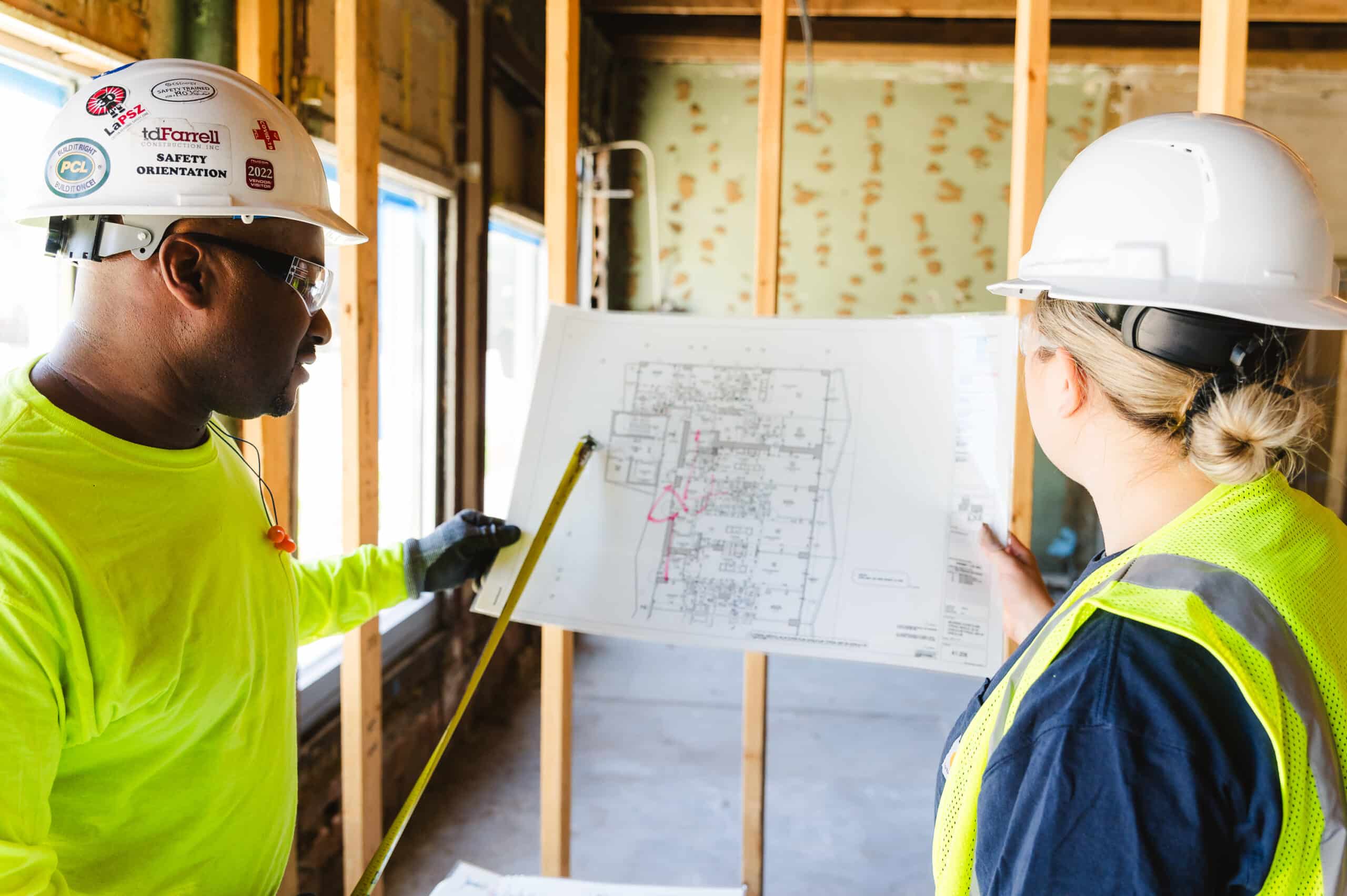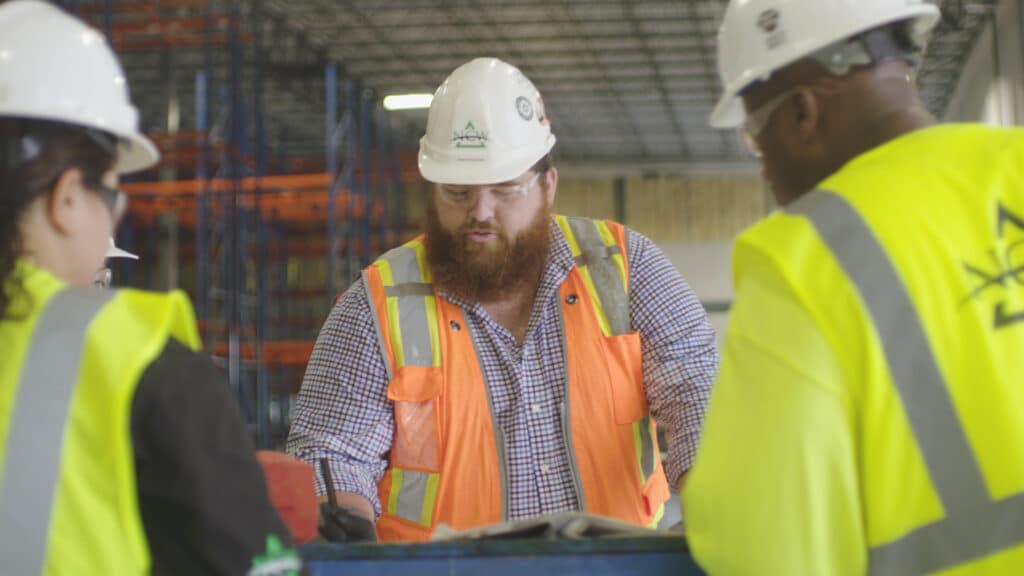
Construction Superintendent Duties
A construction superintendent, also known as a project superintendent, holds a key leadership role when it comes to construction jobs. They’re responsible for planning, coordinating, and supervising all activities on a construction site from a project’s start to its completion. They ensure tasks are completed on time and within budget, and their expertise has an enormous impact on project success.
The construction superintendent is on site daily to manage subcontractors, workers, and sometimes even clients. They work closely with project managers and other stakeholders to ensure project objectives are met. This person also serves as the primary problem solver for any issues that arise during the construction process, making crucial decisions to keep the project moving forward.
Superintendent roles and responsibilities may vary depending on the company in question, but we’ve compiled some of the most important duties you’ll find in any job description:
- Pre-Construction Planning: The project superintendent collaborates with the project team during the planning phase. This includes helping establish the construction timeline, determining necessary resources, and identifying potential challenges.
- Project Supervision: One of the key building superintendent responsibilities is supervising all construction activities on site. They make sure that everything gets done according to schedule.
- Safety and Compliance: Enforcing safety regulations on site is one of the most important construction superintendent duties. The superintendent is responsible for ensuring that all workers and subcontractors adhere to safety regulations and that the work site is free of hazards.
- Quality Control: The project superintendent inspects the quality of work done on site, seeing that it aligns with project specifications and adheres to relevant building codes.
- Communication: As the primary on-site contact, the superintendent communicates regularly with project stakeholders, providing updates on the project status and informing them of any changes or problems.
- Project Completion: At the end of the project, the superintendent conducts final inspections. This involves addressing any deficiencies and managing site clean-up.
Construction Superintendent Skills
Considering all that a construction superintendent is responsible for, it should come as no surprise that they often possess a trove of valuable knowledge. The following construction superintendent skills are vital for success in this field:

- Technical Knowledge: A deep understanding of construction methods, building codes, and safety regulations is crucial. This expertise is usually acquired through formal education and construction superintendent training programs.
- Leadership and Management: In addition to technical knowledge, superintendents must be able to effectively lead a diverse team of workers, subcontractors, and other professionals. Construction supervisor training can help individuals to develop strong leadership skills.
- Problem-Solving and Decision-Making: Construction projects are dynamic, with problems and challenges frequently arising. A superintendent needs strong critical thinking skills to address these issues promptly and effectively. They also must be decisive in making critical decisions that keep the project on track.
- Communication: As the superintendent is the main line of communication between different stakeholders, strong verbal and written communication skills are paramount. Clear, concise communication ensures everyone understands what needs to be done to execute the project successfully.
- Organizational Skills: Juggling multiple tasks, timelines, and workers requires excellent organizational skills. Superintendents must keep track of several elements simultaneously and make sure that everything is progressing according to plan.
- Attention to Detail: Construction involves a plethora of minute details. From ensuring the accuracy of measurements to checking work quality, a keen eye for detail is essential.
How to Become a Construction Superintendent
Becoming a construction superintendent is a years-long journey that requires patience and perseverance. While some work their way up from entry-level positions based purely on experience, most employers prefer candidates with a bachelor’s degree in a relevant field, such as construction management or civil engineering.
After obtaining a four-year degree, aspiring superintendents should look for entry-level positions to gain practical, hands-on experience. Starting as a worker or a foreman provides an understanding of construction work from the ground up.
In some areas, one must pass a construction superintendent test. These exams test candidates’ knowledge and readiness to take on the responsibility of a construction site. They are usually administered by local or state authorities, or independent certification bodies. Scheduling an exam is a great step towards embarking on an official career path.
Becoming a successful construction superintendent requires specific skills and aptitudes. For instance, the strongest candidates often possess impressive leadership and management skills, as superintendents are required to lead and coordinate teams. Communication skills are also essential because superintendents must effectively convey information between project stakeholders.
Once an individual has landed a job as a construction superintendent, it’s important that they keep learning, whether through on-site experience, continued education, or a combination of both. By studying how to become a construction superintendent and applying learned skills throughout their career, future and current superintendents can thrive in their role.
Construction Superintendent Jobs
Those seeking to enter the construction job field today are presented with numerous career opportunities. This is especially true when it comes to construction superintendent jobs, which boast an 8% projected growth over the next decade. The construction superintendent’s salary depends heavily on factors such as education, experience level, and location, and professionals can expect to earn an average median salary of $98,890. This is a rewarding profession for those with a passion for construction.
Construction staffing services like those offered by NCW are a great resource for those launching their careers. These services can connect job seekers with employers looking for construction professionals. In many cases, they even offer job search resources and training and certification programs.
Obtaining a construction superintendent certification online is another viable option for individuals that are interested in a career in construction management. Online certification programs provide flexibility for working professionals and cover key areas such as construction fundamentals and leadership skills. Certification can boost employability and potentially lead to a higher salary.
Ultimately, the superintendent’s career path looks promising. Those that pursue education and training can stand out in this increasingly competitive market, boosting their odds of landing a job and demonstrating to potential employers that they have what it takes to succeed in the industry.
Superintendent vs Foreman vs Project Manager
In the construction field, multiple people work in conjunction to ensure project success. These roles include superintendent, foreman, and project manager. Although they work closely together, each has distinct duties.
One of the key differences between construction superintendent vs project manager is that, while the project manager oversees projects from a higher level, a construction superintendent is usually based on site and deals with day-to-day operations. Construction superintendents often hold various levels of seniority within an organization.
The difference in general superintendent vs senior superintendent usually pertains to the size and complexity of the projects they oversee. A general superintendent might oversee multiple projects simultaneously, coordinating the work of multiple site superintendents. In contrast, a senior superintendent takes charge of a single, larger, or more complex project.
When comparing construction superintendent vs foreman, it’s important to note that a foreman is usually a step below the superintendent. This person is typically in charge of a specific area of the project or trade. The foreman manages a crew of workers, making sure they have the materials they need. The foreman reports to the construction superintendent, who oversees the overall project.
The comparison between superintendent vs foreman vs project manager can be summarized as such: a project manager oversees the entire project from conception to completion, focusing on big-picture items like budgeting, scheduling, and client relations. A construction superintendent is the project manager’s right hand on the job site, implementing the plan and overseeing day-to-day operations. The foreman, in turn, reports to the superintendent and manages a crew of workers.
While understanding the roles of superintendent vs manager vs foreman can be difficult for those that are new to the field, observing each role in action can give them a better idea of what different jobs entail. These roles are often covered in depth in construction superintendent certifications.
Other Resources:
Connect with a Recruiter – Submit your Resume Here
Click Here to Meet the NCW Team
